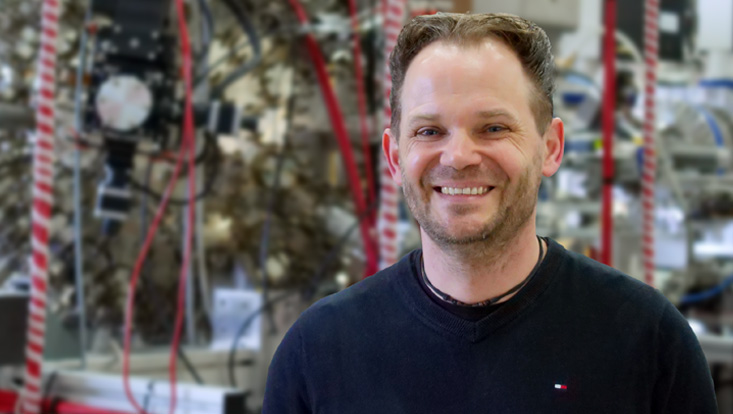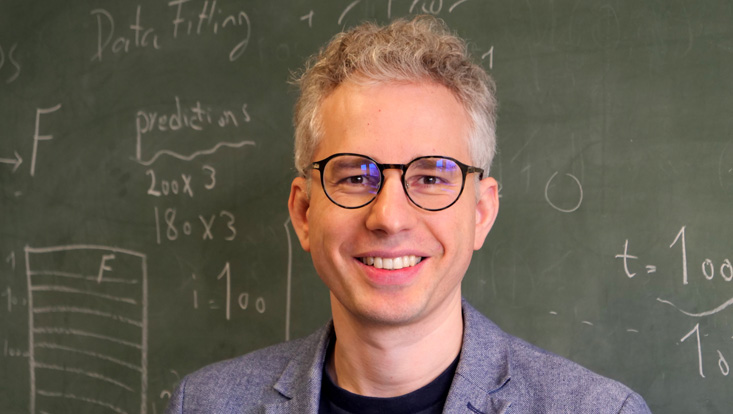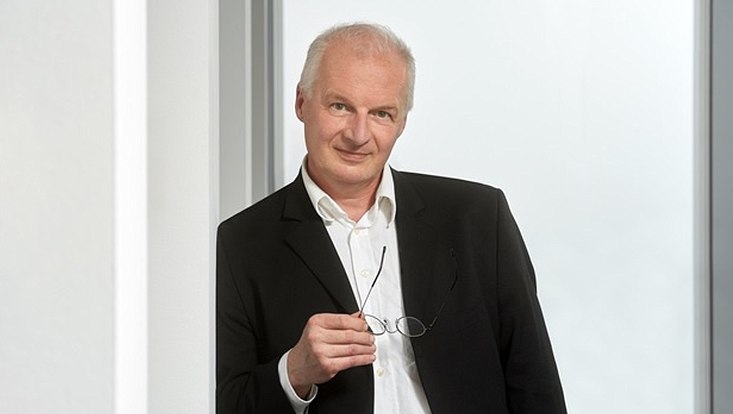Welcome aboard!Research in the Fraction of a Second: “We are just taking baby steps in this field.”Prof. Dr. Markus Ilchen strengthens the Department of Physics
2 April 2024, by Maria Latos

Photo: UHH/Latos
Every year, Universität Hamburg welcomes numerous new researchers. This series introduces them and their areas of research. This time: experimental physicist Prof. Dr. Markus Ilchen.
Prof. Dr Markus Ilchen transferred from Deutsches Elektronen-Synchrotron (DESY) to Universität Hamburg in the Winter Semester 2023/24 to take up the position of W2 professor of experimental physics with a focus on X-ray physics at free electron lasers in the Faculty of Mathematics, Informatics and Natural Sciences.
Mr. Ilchen, you are a professor of experimental physics with a focus on X-ray physics at free electron lasers. What are you researching?
I work on ultrafast processes in chiral molecules. All life-forms consist of these molecules. What I find particularly exciting about my work is that we are currently on the verge of a technological breakthrough, which will allow us to directly observe how electrons move within molecules from the perspective of individual atoms.
What technological breakthrough do you mean?
We developed techniques to make chiral attosecond pulses in the X-ray frequency range visible and measure them. An attosecund is a billionth of a billionth of a second. This year’s Nobel Prize in Physics honored achievements in attosecond physics. The scientists generated laser pulses—lasting some ten attoseconds only—to track individual electron movements. Using an X-ray laser is a special attraction, as impulses are a thousandfold greater, individual atoms can be addressed directly, and the energy is freely selectable for the most part.
What do you hope to gain from this research?
I hope these new tools will enable us to make lot of other groundbreaking discoveries. At the same time we continue to further develop our spectrometers.
What developments are you referring to?
Together with researchers from Dortmund, we are trying, for instance, to put research with spectrometers on a solid and lasting new footing. We aim to find out how we can focus on complex matter, such as molecules in water. Therefore, we are using X-ray lasers to shoot at a molecule surrounded by water. This is a whole different world compared with looking at an isolated, noninteractive molecule. Observing these worlds right next to each other, quasi-parallel, makes this a complex technical endeavor.
Are you making progress?
We have been preparing the experiment for a few years and are almost done setting it up. I truly value the following spirit in research: If it works in principle, we can do it—no matter how rough the road and how large the number of question marks.
This seems to be a perfect example of basic research.
Yes, and it is a great privilege that, in Germany, we are not constantly being asked whether our research is marketable. Of course, basic research is valuable, even when you are hitting a wall or when applications can be used in 20 or 30 year’s time only. It is also important to ensure applied and experimental research are in balance.
What applications could this be in your research?
“We are just taking baby steps in X-ray atto-chirality.” This means, I am hoping that, after the beginning phase, we can move on to conducting exciting initial experiments, which can be translated into useful applications. Results could be applied to medicine, for instance in connection with the effectiveness of drugs.
What can students expect from your teaching?
I am very much in favor of involving students in experiments and measuring times as early as possible. For me, being able to work with an accelerator has always been a key fascinator. Naturally, people get motivated in different ways; some are mostly driven by an interest in technology, others by scientific curiosity or by a fascination with theoretic guesswork. I hope I can make my students understand that physics embraces all types of motivation.
Did you know early on that physics is your thing?
Actually, I realized this quite early. As a student, however, I was mostly overcome with awe and unsure whether I was cut out for studying physics. At first, I studied to become a physics and sport teacher, but my physics passion grew steadily after the first quarter of my studies. I then knew I did not only want to teach the subject, but commit fully to physics. And I hope to ignite a similar passion for the field in my students.


